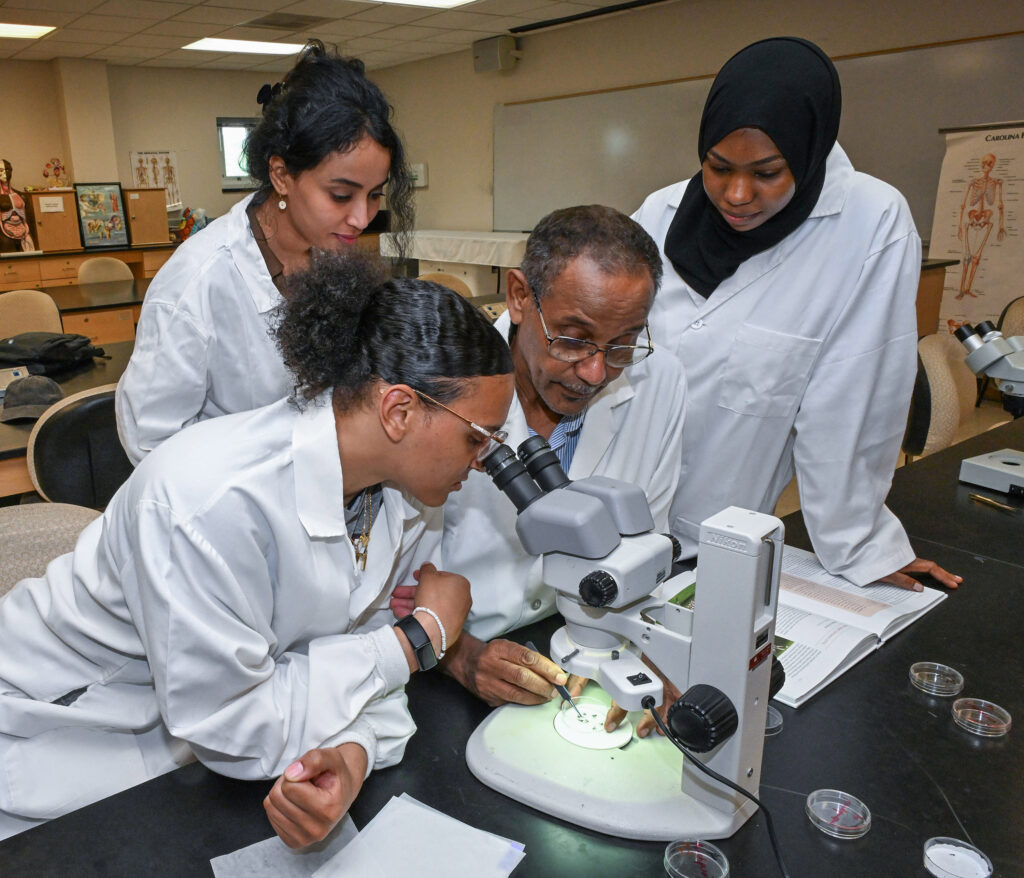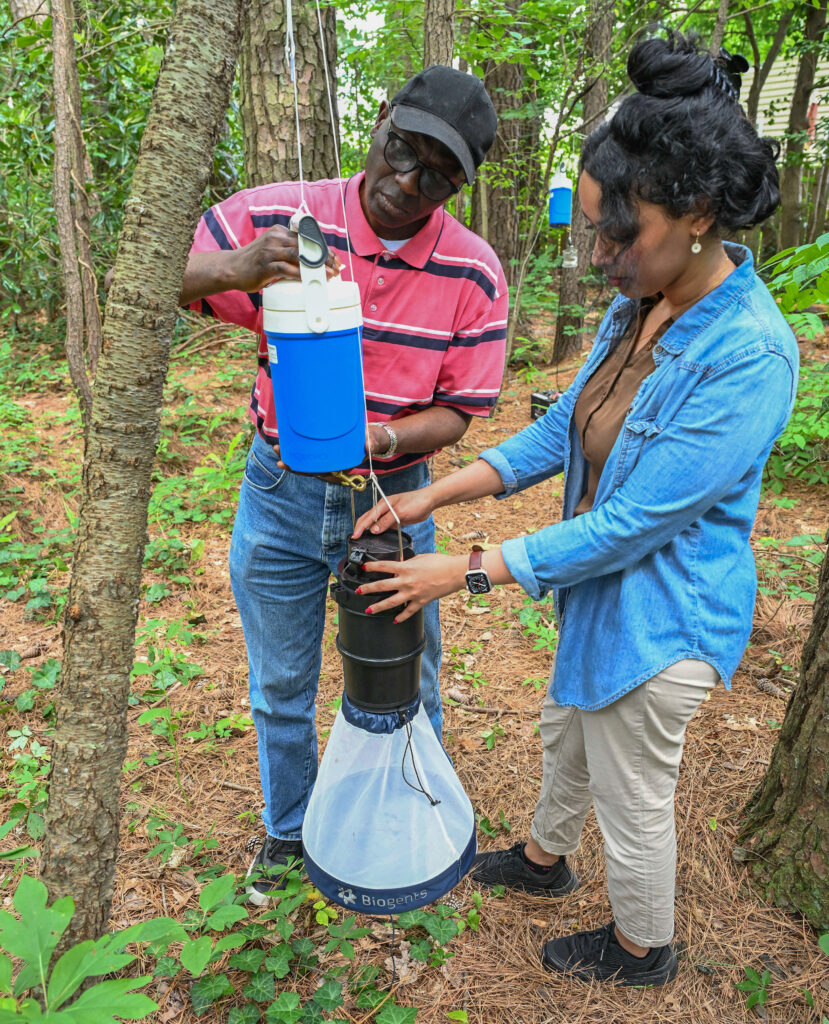UPDATE: On Aug. 26, 2024, the Maryland Department of Health announced the first human case of West Nile virus in the Baltimore Metropolitan region.
Those who follow the news have likely seen recent reports of the West Nile virus in an equine case in Frederick, Maryland, and sentinel chickens used for monitoring mosquito diseases in Kent County, Delaware. Local experts say they are cautiously tracking these cases. Not every mosquito carries the disease, but it is endemic to both states to a degree along with other vector-borne diseases and can be impacted by climate change.

“Our region is full of mosquitoes, including at least 31 varieties,” said Dr. Dia-Eldin Elnaiem (at left, center), professor of medical entomology at the University of Maryland Eastern Shore.
He and a colleague, Dr. Mobolaji Okulate (below, at left), along with undergraduate students, are spending the summer trapping and identifying them at 65 sites. They are also evaluating the performance of mosquito surveillance tools, critical for predicting the impacts of climate change on vector-borne diseases in the region.
“The extensive fresh and brackish water resources on the Delmarva Peninsula and relatively long hot summer season already provide a favorable environment for mosquitoes to thrive,” he said.
Add to that the increasing effects of climate change and a perfect storm could be brewing in the not too distant future.

“Insects are very susceptible to changes in temperature and other weather patterns and it can happen fast,” Elnaiem explained. “Increasing amounts of rain from climate-intensified weather and natural disasters like hurricanes give more places for mosquitoes to breed. Sea level rise contributes to more brackish water standing where it was once dry land.”
Numbers can multiply quickly and mosquito species carrying a variety of diseases like dengue, zika, encephalitis and malaria can spread into new areas to inhabit. They can also become more voracious with changes in habitat and environmental conditions.
“The Asian tiger mosquito, for instance, is an aggressive biter and carrier of diseases that was not seen in the United States until 30 years ago. It originated in Asia, but spread to the southeastern U.S. and throughout 26 states,” the researcher said. “Cases of dengue, mainly from international travel, have recently been seen in Texas, Florida and the non-continental states like Puerto Rico. There are pockets of yellow fever in Africa that have the potential to make a comeback, if not properly monitored, vaccinated for and controlled.”
How UMES helps keep Maryland ahead of mosquito changes?
“On the UMES side, our research can provide global mapping of populations and environmental changes that can help us predict their activity, prevalence and migration,” Elnaiem said. “The state’s mosquito control program does a great job with monitoring and control.”
Elnaiem is collaborating with Dan Schamberger (below), an administrator III with the Maryland Department of Agriculture’s Mosquito Control Section.

“Surveillance is the best method to see what is changing in the field,” said Schamberger, a 30-year veteran with the MDA program. “For a new species, it is important to know the biology of the insect and its preferred habitat for laying eggs. Knowledge-based decisions can then be made on how to control them, such as spraying adults or controlling larvae in the water.”
Technology has come a long way for safely preventing mosquito populations from getting out of control.
“We follow an Integrated Pest Management Program that relies on multiple, rather than one, method for mosquito control,” Schamberger said. “It is also important to use products tested, labeled and regulated through the U.S. Environmental Protection Agency. Biological products are being more frequently used to mitigate toxicity and assure safety to humans, animals and desired insect species.”
What can you do?
“All Marylanders should take precautions against mosquito bites. Try to avoid being outside in mosquito-prone areas at dawn and dusk. Wear long sleeve shirts and pants, particularly at those times when outdoors or use insect repellent,” Schamberger said.
“Symptoms are similar to the flu and usually resolve on their own. Complications can arise, particularly among the elderly, so consult a health care provider if anything is concerning. A veterinarian should be consulted for livestock concerns, and animals should be up to date on all necessary and available vaccinations.”
Elnaiem added that educating the next generation of scientists and raising public awareness are keys to controlling vector-borne diseases. UMES aims to train undergraduates in new upper-level courses and research experiences in medical and vectoral entomology, and medical and parasitical entomology.
“The public is also encouraged to cooperate with the Maryland Department of Agriculture in reporting so that the Mosquito Control Section can appropriately respond with monitoring and control.”
Gail Stephens, agricultural communications, University of Maryland Eastern Shore, School of Agricultural and Natural Sciences, UMES Extension, gcstephens@umes.edu, 410-621-3850.
Photos by Todd Dudek, agricultural communications, University of Maryland Eastern Shore School of Agricultural and Natural Sciences, UMES Extension, tdudek@umes.edu

